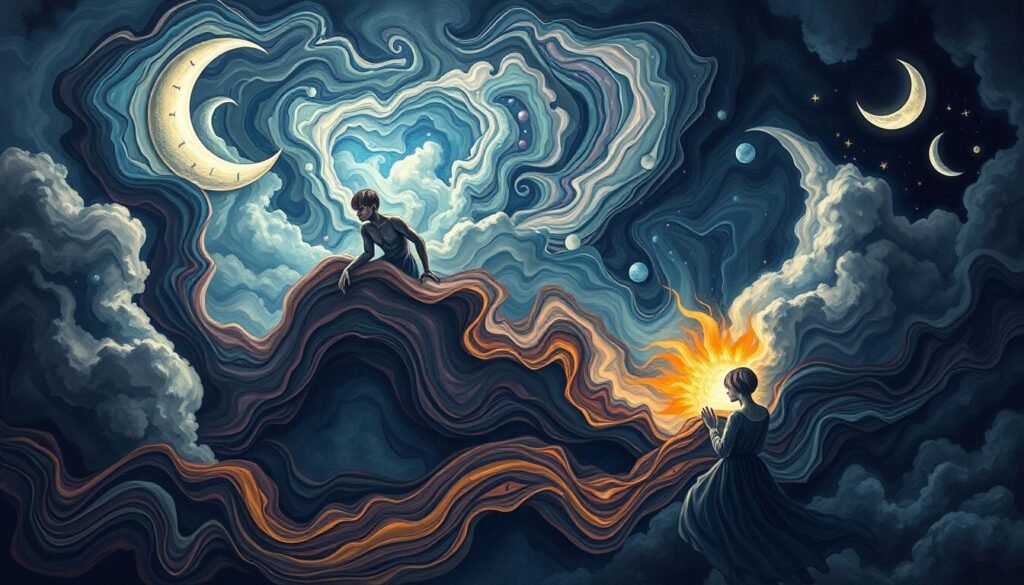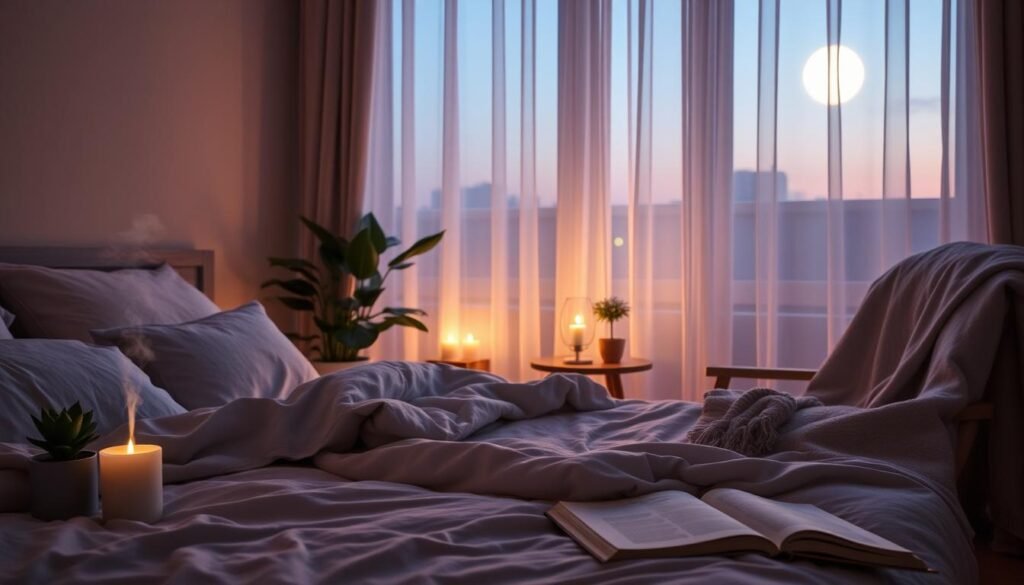Did you know that insomnia can make you ten times more likely to get depressed? This fact shows how much sleep disorders can hurt mental health. It tells us how deeply insomnia is linked with mood disorders. Also, around 80% of depressed people struggle with sleep. This shows that sleep issues and mental health are closely connected.
To deal with this, it’s key to understand how they are linked. Treating insomnia could not only make you sleep better. It could also lessen feelings of depression. Therapies like cognitive behavioral therapy (CBT) for sleep issues show promise. With about 75% of depressed individuals having trouble sleeping, it’s clear one issue often leads to the other.
Key Takeaways
- People with insomnia are ten times more likely to experience depression.
- Approximately 75% of individuals with depression face sleep disturbances.
- Improving sleep quality can significantly enhance mental health outcomes.
- Cognitive Behavioral Therapy for Insomnia (CBT-I) is a viable treatment option.
- Sleep problems may increase the risk of depression relapse.
- Connection between sleep architecture and depression highlights the need for effective sleep treatment.
The Connection Between Insomnia and Depression
Insomnia is the top sleep disorder in the United States, affecting about 1 in 3 adults. It is especially common among women, which links it to mood disorders like depression. Even though adults need 7 to 9 hours of sleep, most Americans only get about 6.9 hours.
This lack of sleep can make feelings of sadness and hopelessness worse. It creates a hard cycle to break.
The link between insomnia, depression, and other sleep problems is complex. Studies show that long-term insomnia can make depression symptoms worse. It can come from health issues, stress, or other sleep disorders, leading to worse mental health.
This problem can also cause other sleep disorders, like sleep apnea. People with narcolepsy are also more likely to be depressed. So, treating insomnia could help make mental health better. Doctors often prescribe medicines like SSRIs or SNRIs to help.
Behavior changes can also be helpful. Methods like meditation, exercise, and better sleep settings can enhance sleep. With 38.7% of people showing serious depression symptoms, it’s vital to link sleep and mood disorders.
Knowing how insomnia and depression connect can lead to better treatment. Focusing on sleep issues might help catch and treat mental health problems early.
The Impact of Insomnia on Mental Health
Insomnia greatly impacts one’s mental health. It can lead to depression, anxiety, and trouble thinking clearly. About 20% of people are facing insomnia disorder nowadays. This number went up a lot since the pandemic began. Many people have found it hard to sleep well during these times.
More than half of all Americans had trouble sleeping during the pandemic. Especially, 70% of those between 35-44 years old felt this impact deeply.
Chronic insomnia makes it hard for the brain to work right. People who don’t sleep well have different sleep patterns than those who do. They take longer to fall asleep, which hurts their ability to think.
Not sleeping enough makes people feel upset and stressed. This can make depression symptoms worse. It’s important to tackle insomnia to feel better both mentally and emotionally.
Not getting enough sleep does more than just make you tired. It can make stress levels go up. This can make other mental health issues harder to deal with. Feeling emotionally and mentally worn out affects your daily life and happiness.
Handling insomnia is key to better sleep. It also helps improve mental health and lessen depression’s impact.
| Statistic | Percentage |
|---|---|
| Adults meeting criteria for insomnia disorder | 20% |
| Americans experiencing sleep disturbances during the pandemic | 56% |
| Individuals aged 35-44 with sleep disturbances | 70% |
| General population with poor sleep symptoms | 20-30% |
| Population suffering from chronic insomnia | 8-10% |
Symptoms of Insomnia Depression
Those with insomnia depression deal with symptoms that heavily affect daily life. Recognizing these symptoms is key to getting the right help. Symptoms are mainly emotional changes, cognitive issues, and physical problems. Understanding these can show how insomnia and depression mix, hurting someone’s health.
Emotional Changes
People with this condition often feel deep emotional shifts. They may feel very sad or hopeless. Simple tasks can feel too hard, leading to more irritability and frustration. Fatigue is both a physical and emotional weight, making depression harder to handle.
Cognitive Impairments
Thinking clearly becomes difficult too. Focusing on work or chats can be tough. It might also be hard to remember things, adding to feelings of being less than. These issues can make the depression and insomnia worse.
Physical Symptoms
The body also suffers. Feeling sleepy during the day can ruin normal tasks and lower how much gets done. Eating too much or not enough can affect health and energy. Feeling tired all the time makes it hard to get through the day.
| Symptom Category | Examples of Symptoms |
|---|---|
| Emotional Changes | Sadness, hopelessness, irritability, continual fatigue |
| Cognitive Impairments | Poor concentration, memory issues, difficulty in decision-making |
| Physical Symptoms | Daytime sleepiness, loss of appetite, persistent fatigue |
The Bidirectional Relationship of Sleep Disorders and Mood Disorders
The link between sleep and mood disorders is complex and deep. It goes both ways and greatly affects both issues. Studies show sleep problems increase the risk of mood disorders like depression. About 90% of people with depression struggle with sleep issues like insomnia and narcolepsy.
Insomnia is a major risk factor for depression in both the young and old. Seventy-five percent of those with depression have trouble sleeping. This makes their mental health issues even worse. Sleep problems seem to make mood disorders more likely, affecting nearly a quarter of people worldwide each year.

Research has found some important points:
- Sleep problems can lead to mood disorders.
- Changes in REM sleep are common in those with depression. This signals the disorder.
- Kids with early sleep issues may face depression later.
- Long-term insomnia can lead to higher inflammation levels, especially in women.
- Depression affects serotonin. This changes sleep patterns over time.
Treating sleep disorders helps reduce mood disorder symptoms. Insomnia could be its own issue or a sign of depression. But it’s clear treating both at the same time is crucial for mental health.
| Condition | Impact on Sleep | Impact on Mood |
|---|---|---|
| Insomnia | Difficulty falling/staying asleep | Increased risk of depression |
| Depression | Sleep disturbances (e.g., REM changes) | Heightened mood disorders |
| Sleep Apnea | Frequent awakenings | Elevated risk of mood disorders |
| Narcolepsy | Excessive daytime sleepiness | Comorbid psychiatric issues |
Understanding the Role of Circadian Rhythm
The circadian rhythm acts as our internal clock. It controls when we sleep and wake up. It also affects how well we sleep. Problems with this rhythm can lead to insomnia and depression. This makes us feel very tired and stressed out. Learning to support our circadian rhythm can improve both mental and physical health.
How Circadian Rhythm Affects Sleep Quality
There’s a strong link between circadian rhythm and sleep quality. Light at night can disturb sleep for over 80% of people. And about 15-20% who work at night often don’t get enough sleep. This can make sleep problems and mood issues worse.
Having a regular daily schedule can help set your circadian rhythm. Getting sunlight during the day helps you sleep at night. Avoiding screens before bed also helps. Deep sleep is important for healing your body. It helps with immune function, heart health, and cleaning the brain.
It’s key to manage these rhythms to fight insomnia and depression. Small changes like a steady sleep routine or bright light therapy can improve mood and health. For more help, check out this guide. It has tips on better sleep and fighting depression.
Signs of Depression to Watch For
Knowing how to spot depression is key to getting help fast. People with depression show physical and emotional signs that need attention.
Physical and Emotional Indicators
Depression can make you feel very tired, have little energy, and hurt without reason. For emotions, you might feel:
- Persistent sadness
- Anxiety or restlessness
- Difficulty concentrating or making decisions
- Loss of interest in activities previously enjoyed
Everyone experiences depression differently, but these signs are common. They show something deeper is going on that needs care.
When to Seek Help
If these feelings last over two weeks, it’s time to seek help. Getting help early can make a big difference. You should talk to a mental health professional if you notice changes in how you feel or act. Realizing you need support is the first step to feeling better.
Insomnia Depression: Treatment Options
Treating insomnia depression needs a multi-step plan. It includes therapy, medicine, and brain stimulation. Tailoring treatments to each person is key for success.
Cognitive Behavioral Therapy for Insomnia
Cognitive Behavioral Therapy for Insomnia, or CBT-I, helps those with sleep problems from depression. It changes negative thoughts and behaviors that mess up sleep. CBT-I improves sleep quality and helps people manage their mental health better.
Medications and Antidepressants
Doctors often pick SSRIs and SNRIs for treating depression and sleep issues. Medicines like fluoxetine and venlafaxine are helpful. Some antidepressants may not help sleep directly, so ones like mirtazapine or trazodone might be used to better sleep quality.
Brain Stimulation Therapies
Brain stimulation, like Electroconvulsive Therapy (ECT), helps severe insomnia depression. It’s used when other treatments don’t work. ECT quickly improves mood and sleep problems, making it an important treatment choice.
| Treatment Type | Examples | Benefits |
|---|---|---|
| Cognitive Behavioral Therapy | CBT-I | Addresses negative thought patterns related to sleep |
| Medications | SSRIs, SNRIs, sedating antidepressants | Reduces symptoms of both depression and insomnia |
| Brain Stimulation Therapies | Electroconvulsive Therapy (ECT) | Rapid improvement in mood and sleep |
For more information on treatment options for insomnia depression, check out this link. Always talk to mental health experts for advice tailored to your needs.
Strategies for Better Sleep
Getting good sleep is crucial, especially if you’re dealing with insomnia or depression. To improve your sleep, focus on two key things: handling stress and setting up a sleep routine. These steps can make a big difference in how well you sleep and feel overall.
Stress Management Techniques
Managing stress is key to sleeping better. Practices like mindfulness and relaxation exercises lower stress, making sleep come easier. Writing in a journal before bed helps too. It lets you offload your worries, clearing your mind for sleep. Stress management can greatly improve your sleep quality and how long you sleep.
Establishing a Sleep Routine
A regular sleep pattern is important for good sleep hygiene. Sleeping and waking up at the same times every day sets your internal clock. This can help with insomnia and let you sleep better. Limiting screen time before bed and making your bedroom comfortable for sleep are also helpful. Doing these things every day can really help your sleep and mental health.

| Strategy | Description | Benefits |
|---|---|---|
| Mindfulness | Focus on the present moment through meditation or deep-breathing exercises. | Reduces anxiety, promotes relaxation, improves sleep quality. |
| Journaling | Writing down thoughts and feelings before bed to clear the mind. | Alleviates racing thoughts, reduces mental clutter. |
| Consistent Sleep Schedule | Going to bed and waking up at the same time daily. | Regulates the body’s internal clock, improves sleep quality. |
| Comfortable Sleep Environment | Creating a cozy and dark bedroom with minimal distractions. | Enhances relaxation, promotes deeper sleep. |
How to Manage Anxiety to Improve Sleep
Managing anxiety is key to better sleep for those with insomnia depression. Anxiety makes sleep issues worse. It leads to a tough cycle. Those who struggle to sleep three nights a week may find help with specific strategies.
Cognitive behavioral therapy (CBT) is a big help for anxiety. This method focuses on how anxiety affects sleep. Also, moving your body during the day improves sleep. But, don’t exercise right before bed. Aim for morning or afternoon instead.
Having a regular sleep schedule helps too. Sleeping and waking up at the same times every day tells your body when to rest. This fights off tiredness and moodiness from anxiety-related insomnia. Also, avoid caffeine, sugar, and alcohol at night to beat wakefulness that feeds anxiety.
About 20% of American adults suffer from anxiety disorders. Nearly half of those with depression also have anxiety. Tackling anxiety can make sleep better. This leads to improved mental health.
| Strategy | Description | Benefit |
|---|---|---|
| Cognitive Behavioral Therapy (CBT) | Psychological treatment focusing on changing patterns of thinking or behavior | Reduces anxiety and improves sleep quality |
| Regular Exercise | Routine physical activity, ideally not too close to bedtime | Enhances overall sleep quality |
| Consistent Sleep Schedule | Going to bed and waking up at the same times daily | Helps establish a natural sleep routine |
| Good Sleep Hygiene | Limiting stimulants like caffeine and alcohol before sleep | Prevents disrupted sleep and reduces anxiety |
The Importance of Seeking Professional Help
It’s vital for people struggling with insomnia and depression to seek professional help. About 50 to 70 million Americans deal with chronic sleep issues. This affects their overall well-being. Recognizing the value of professional support is the first step towards recovery. With the right diagnosis and treatment plan, many see great improvements.

Finding the Right Mental Health Resources
Finding good mental health resources is crucial for handling insomnia depression. Therapists trained in Cognitive Behavioral Therapy for Insomnia (CBT-I) are very helpful. This method often works better than sleeping pills. Psychiatrists can help with meds, while support groups share personal stories to make mental health a normal topic.
A lot of people with clinical insomnia do seek help – around 39.8% see a healthcare provider. This is a good trend. Talking to doctors helps folks understand and manage their sleep and mood issues better.
If you’re dealing with these problems, reach out to a healthcare provider. Starting this chat might seem hard, but it could change your life. For more help, check out these mental health resources. They are designed to assist in your recovery journey.
| Resource Type | Description |
|---|---|
| Therapists | Specialize in methods like CBT-I to address sleep and mood challenges. |
| Psychiatrists | Provide medication management and can diagnose sleep disorders. |
| Support Groups | Encourage sharing of experiences and knowledge among peers. |
Conclusion
Addressing insomnia depression is crucial for improved mental health. Studies show 20 to 35% of people report insomnia symptoms. The link between insomnia and depression is significant, with a risk estimate of 2.27. This shows how important it is to notice symptoms and see how lack of sleep affects mood.
The odds of insomnia leading to depression are strikingly high at 2.60. This highlights an urgent need for awareness and action.
Many effective treatments are available, from cognitive behavioral therapy to medication. These can greatly improve life quality for affected individuals. Ongoing research helps us better understand this complex relationship. People are urged to address insomnia depression actively. By doing so, they can improve their mental health and live more joyfully.
In conclusion, knowing the link between sleep and mood is vital. It opens doors to effective treatments. Recognizing symptoms of insomnia depression is the first step. Seeking help is crucial for mental well-being.